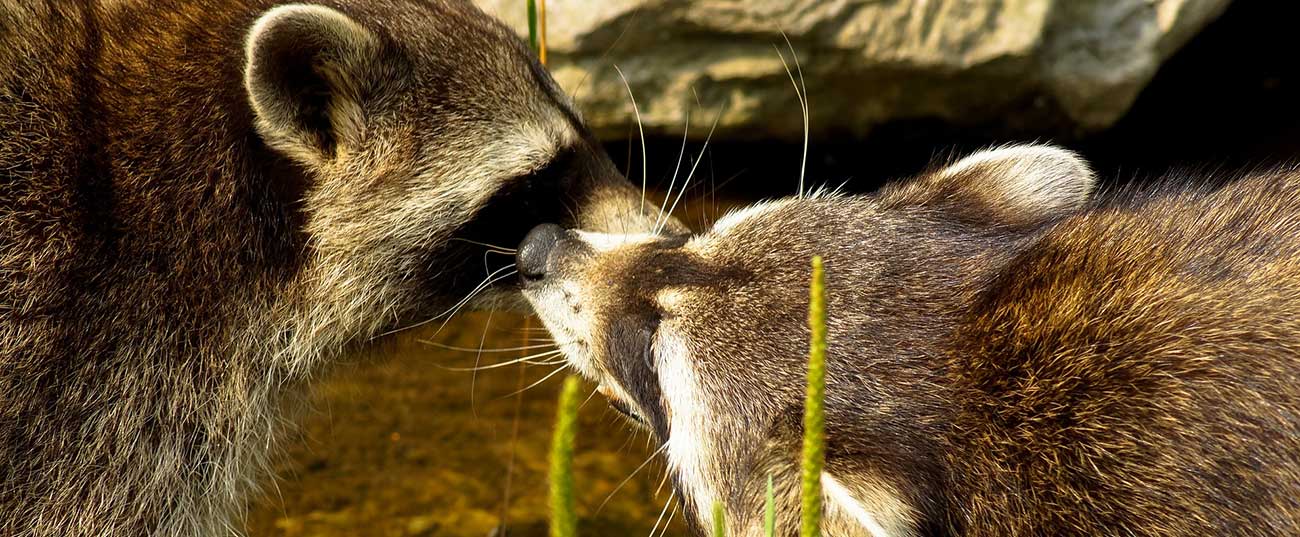Raccoons aren’t as innocent as they look. Not only can they cause significant destruction to your home or property, but they also carry a variety of diseases that can be contracted by humans and domestic pets. Raccoon diseases can be contracted through scratches, bites, and through contact with raccoon poop and urine.
In this blog post, we will cover how common diseases carried by raccoons can be prevented and what symptoms to look out for should anyone come down with one of them.

What Are the Signs and Symptoms of a Sick Raccoon?
It is important to note that while raccoons are considered nocturnal, they are frequently seen during daylight hours when searching for food and water. While most raccoons will avoid contact with humans, raccoons who feel threatened or are sick may attack in defense.
A sick raccoon may make strange sounds or show signs of difficulty walking, rough, matted fur, weight loss, aggression/fear, and/or hiding or staying in one place for long periods.
What Are Common Raccoon Diseases?
Raccoons can carry several different diseases that may cause mild to severe illness if contracted by humans or pets. A sick raccoon can directly or indirectly transmit a disease to humans through physical encounters such as bites or scratches, any contact with bodily fluids, and contaminated water and food sources. They can also pass the infection to pets.
While most raccoon transmitted diseases can be quickly treated with no lasting effects, some can be fatal to humans and pets if not promptly addressed.
Rabies
Rabies often causes raccoons to stagger, display erratic behaviour, emit high-pitched sounds, and/or be oblivious to nearby activity. Rabies can be spread to humans and domesticated pets through bites, scratches, and contact with saliva from a rabid raccoon. If left untreated, rabies can be fatal for humans and pets. Taking preventive raccoon control measures and ensuring your pet is updated on their vaccinations can reduce the risks of the disease.
Canine Distemper
Distemper is a virus among the raccoon population that causes laboured breathing, eye and nose discharge, disorientation, and erratic behaviour. While it is not transmissible to humans, it can be fatal for domestic dogs that encounter raccoon poop. Luckily, transmission can be prevented with the right vaccines.
Leptospirosis
The Leptospira bacteria found in raccoon urine is transmissible to both humans and pets. Unfortunately, an infected raccoon doesn’t always show noticeable symptoms of this disease. Water sources, soil, and objects that come in direct contact with raccoon urine can become contaminated, spreading the disease to humans and pets. Leptospirosis is transmitted through inhalation of the bacteria, skin contact, and consumption of a contaminated source. Without treatment, leptospirosis can cause kidney damage, meningitis, liver failure, respiratory distress, and even death.
Giardiasis
Giardiasis, which is a parasitic disease, is found in raccoon poop and is transmissible through contaminated soil, water, and surfaces. There aren’t any significant symptoms of giardiasis in raccoons other than matted fur and low weight in young kits. Giardiasis causes diarrhea and other gastrointestinal symptoms. To reduce the risk of contracting giardiasis, you should have raccoon poop removed and contaminated surfaces disinfected by professionals. In addition, domestic animals can be vaccinated.
Salmonellosis
Salmonellosis is a bacterial disease found in many animals, including raccoons. Salmonella causes symptoms of lethargy and a staggered gait and may cause the raccoon to be extremely tame. By consuming contaminated fish, plants, or water, raccoons can transmit this disease through their poop. The best way to avoid contracting this disease is to use a water filtering system for you and your pets.
Baylisascaris Procyonis (Raccoon Roundworm)
As a widespread disease among the raccoon population, raccoon roundworm is an infectious disease found in raccoon poop and contaminated soil. It causes little to no behavioural symptoms in raccoons. In addition, it is rarely transmitted to humans because contaminated poop or soil that contains the infectious eggs needs to be consumed in order to spread the disease.
Factors That Contribute to the Spread of Raccoon Diseases
Raccoon transmittable diseases can spread to humans due to several reasons, specifically environmental factors and changes in the behaviours of both humans and raccoons. Raccoons are resourceful animals. As urban developments grow into the regions where raccoons primarily live, they learn to adapt and coexist with humans as they search for food, water, and shelter.
As raccoons grow more comfortable living near humans, they become exposed to human waste and other sources of human food, leading to a greater risk of disease transmission. Additionally, since raccoons have no natural predators in urban areas, their population has been booming, further contributing to the spread of diseases. The more raccoons that live in an urban area, the higher the risk of human infection due to contaminated surfaces, inhalation, and ingestion of viruses and bacteria.
Preventive Measures
To reduce the risk of exposure to raccoon diseases, follow these preventive measures.
- Secure trash cans and remove outside pet bowls and other food sources
- Close off entry points to the home, garage, or shed. Seal any openings or gaps along the foundation, roof, attic, and chimney.
- Hire a professional animal control service to find weak points on your property that may attract the raccoons. Have a professional company install raccoon repellent systems.
Protect Against Raccoon Diseases with the Help of Hawkeye
Hawkeye Bird and Animal Control is the only pest bird and animal/wildlife control company in Canada to be designated "Certified Wildlife Control Professional" AND hold the following licenses: Trapping of Fur Bearing Animals Permit, Falconry Permit, and Pest Control License. Hawkeye not only safely and effectively removes raccoons, but our team also initiates measures on the property to deter invasion by other wildlife. Contact us at (416) 429-5393 to learn more.














